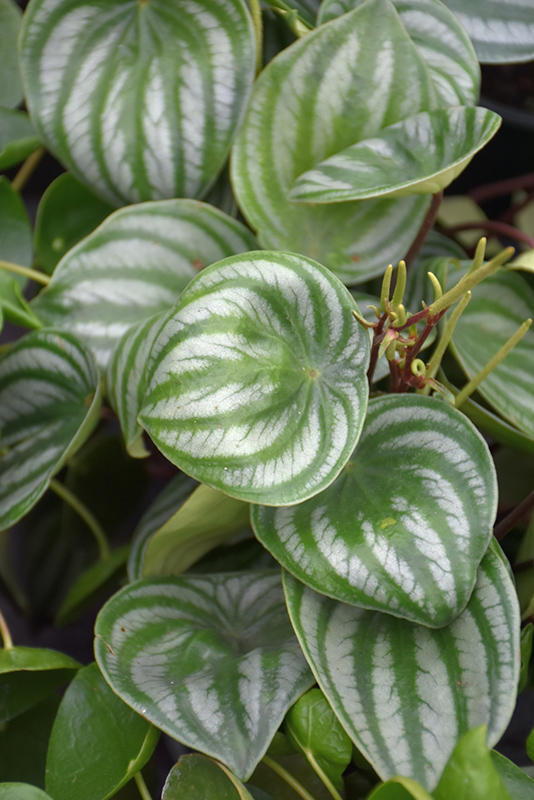Get ready to ignite your excitement and cultivate unforgettable memories
with Wallace's Garden Center Events! We're thrilled to invite you to a world of
enchanting experiences, where every gathering is a celebration of nature, community, and pure fun.
Plant Finder
Plant Height: 12 inches
Flower Height: 24 inches
Spacing: 12 inches
Sunlight:
![]()
Other Names: form. Peperomia sandersii
Description:
This stunning plant features intricate, heart shaped, silvery pale green leaves with dark green veining, resembling a watermelons skin; flower stalks with green flowers may appear, but are not showy; low to bright light, but no direct sun
Features & Attributes
Watermelon Peperomia's attractive textured heart-shaped leaves emerge light green, turning grayish green in color with distinctive dark green veins and tinges of silver throughout the year on a plant with a mounded habit of growth. The brick red stems are very effective and add to the plant's interest.
This is an herbaceous evergreen houseplant with a mounded form. This plant may benefit from an occasional pruning to look its best.
Planting & Growing
When grown indoors, Watermelon Peperomia can be expected to grow to be about 12 inches tall at maturity extending to 24 inches tall with the flowers, with a spread of 14 inches. It grows at a slow rate, and under ideal conditions can be expected to live for approximately 5 years. This houseplant should only be grown away from direct sunlight or in a room with strong artificial light. It is very adaptable to both dry and moist soil, but will not tolerate any standing water. The surface of the soil shouldn't be allowed to dry out completely, and so you should expect to water this plant once and possibly even twice each week. Be aware that your particular watering schedule may vary depending on its location in the room, the pot size, plant size and other conditions; if in doubt, ask one of our experts in the store for advice. It will benefit from a regular feeding with a general-purpose fertilizer with every second or third watering. It is not particular as to soil type or pH; an average potting soil should work just fine.
There are many factors that will affect the ultimate height, spread and overall performance of a plant when grown indoors; among them, the size of the pot it's growing in, the amount of light it receives, watering frequency, the pruning regimen and repotting schedule. Use the information described here as a guideline only; individual performance can and will vary. Please contact the store to speak with one of our experts if you are interested in further details concerning recommendations on pot size, watering, pruning, repotting, etc.
-- THIS IS A HOUSEPLANT AND IS NOT MEANT TO SURVIVE THE WINTER OUTDOORS IN OUR CLIMATE --


